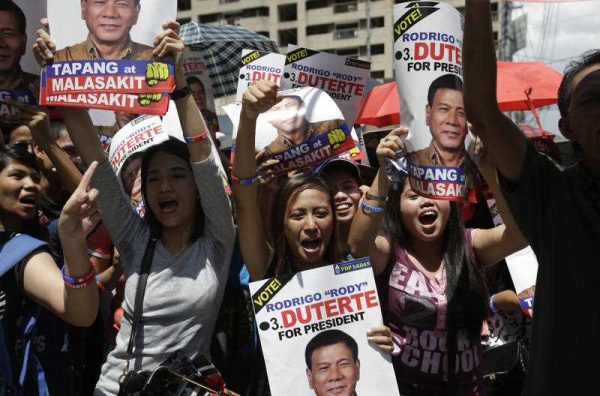The intense contest for the highest national position in the 9 May election is being described as a battle between ‘continuity’ and ‘change’. Continuity is represented by the presence in the race of former secretary of the interior Mar Roxas, who is selling the achievements of the administration of outgoing President Benigno Aquino Jr. in whose cabinet he served.
Change, on the other hand, is being espoused by other candidates wishing to deliver a ‘better’ Philippines. The surge in popularity of Rodrigo Duterte over other candidates with more established national political roles has been attributed to his tough stance on law and order as well as his record of efficient public service delivery. The Davao city mayor’s popularity remains unaffected by accusations of extrajudicial killings of petty criminals as well as his rough and uncouth language.
But why would voters prefer ‘change’ when the Philippines has achieved so much in the last five years, including becoming one of the fastest growing economies in Asia? The answer is because democracy and economic growth have not delivered the rule of law.
Equality and fairness are at the heart of the rule of law. An unfair legal system is popularly viewed as one cause of the wide gaps both between the rich and poor and between urban and rural areas in the Philippines. The level of income inequality in the Philippines is one of the worst in Asia. Perceptions of bias and impunity in the legal system are rife, especially as citizens routinely see charges of corruption being laid on some officials that survive only as long as the next election.
Public opinion surveys indicate that those who share in the aspiration for change are a sizeable chunk of the middle class and professional electorate. They resent the continued sense of entitlement of the elites and widespread corruption. They desire more effective government, expect better transportation infrastructure, health and other social services. And they want greater economic opportunities and the ability to participate in the business of ruling.
Duterte, and his reputation for being tough on law and order in Davao, resonate deeply with these voters. Ironically, although Duterte’s crackdown on crime may appeal to voters who desire a safe and clean Philippines, his use of extrajudicial killings indicates that he is not a supporter of the rule of law. It seems that in their desire for change and accountability, the idea of an effective politician who is willing to move outside the law holds greater appeal for some than the dysfunction and corruption they associate with the status quo.
So what then are Philippine voters looking for in a president? There are two issues relating to the rule of law that voters have prioritised in the 2016 race.
First, law enforcement matters and should be applied without fear or favour. The Philippines has good laws adopted from best international practices but they are poorly or selectively enforced. To make the law work, it is essential to have competent and depoliticised law enforcement agencies and bureaucracies. Towards this goal, more investment should be made in reforming the practices and culture of government offices.
Second, accountability among public officials is sorely lacking. This is exacerbated by dysfunctional accountability mechanisms. In this election period, people are demanding greater accountability for public officials who break the law, who abuse their authority, or who simply neglect their responsibilities in delivering public services. Manila’s public infrastructure — from roads to trains to airports — has become symbolic of poor public service and a lack of responsiveness to the daily struggles of ordinary citizens.
Leadership on accountability issues is one virtue that people are looking for in a president: someone who can set an example or put themselves on the line when things go wrong. Extraordinary and tragic events such as the Mamasapano massacre of police officers, Typhoon Haiyan and the Kidapawan incident have made people wary of officials who excuse themselves from taking full responsibility for the consequences of their actions, or indeed their inaction.
The intertwined issues of rule of law, accountability, corruption and effective governance are major concerns of this presidential election. When laws are enforced, people can expect more responsive and accountable public officials as well as a wider space for participation and a relatively more even playing field. It is only with rule of law that democracy becomes meaningful to the citizenry.
Imelda Deinla is a Postdoctoral Fellow at the Regulatory Institutions Network, The Australian National University.

